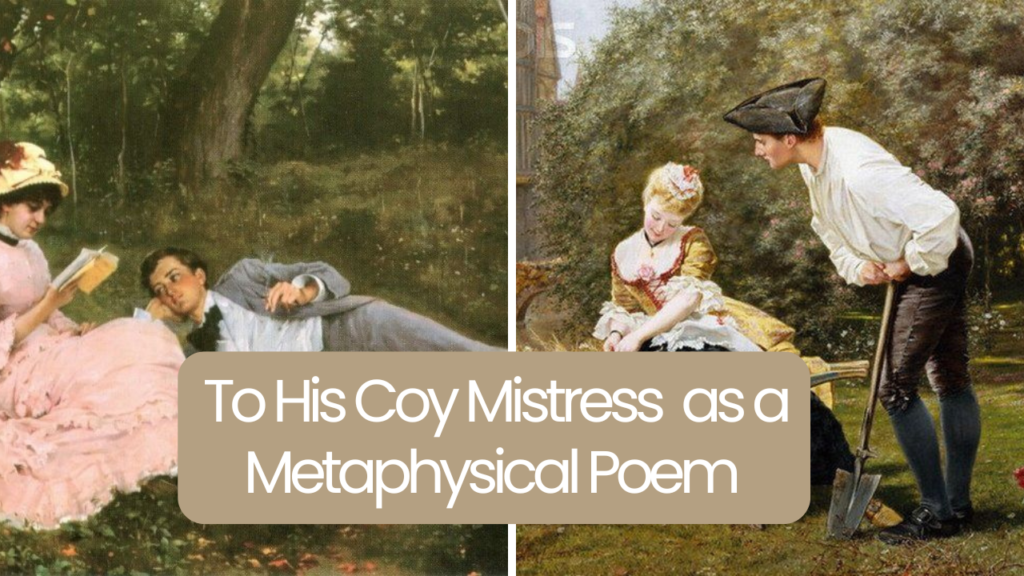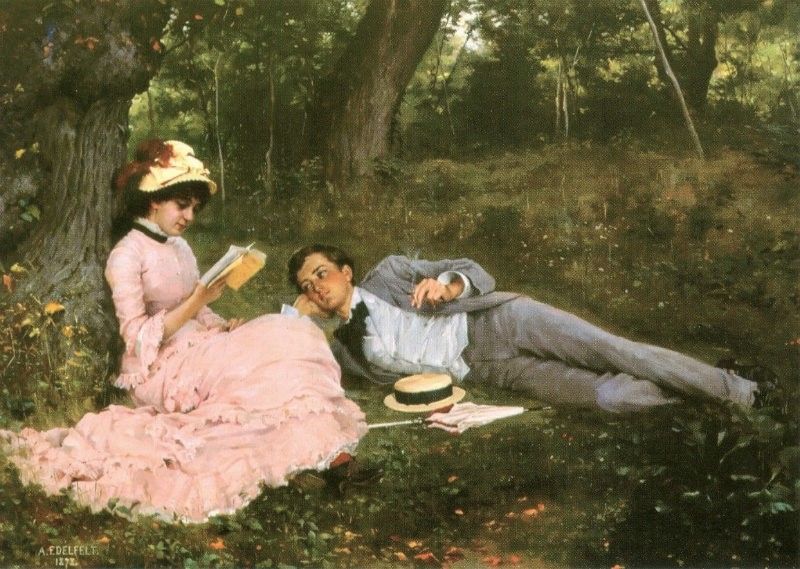To His Coy Mistress
by Andrew Marvell
Had we but world enough, and time,
This coyness, lady, were no crime.
We would sit down, and think which way
To walk, and pass our long love’s day.
Thou by the Indian Ganges’ side
Shouldst rubies find; I by the tide
Of Humber would complain. I would
Love you ten years before the Flood,
And you should, if you please, refuse
Till the conversion of the Jews.
My vegetable love should grow
Vaster than empires, and more slow;
An hundred years should go to praise
Thine eyes, and on thy forehead gaze;
Two hundred to adore each breast,
But thirty thousand to the rest;
An age at least to every part,
And the last age should show your heart.
For, lady, you deserve this state,
Nor would I love at lower rate.
To His Coy Mistress is a clever and well structured dramatic monologue where the speaker is persuading his beloved to shed of her shyness and engage in love tryst with him.
Time and tide waits for none. This condition is used in order to make the beloved realize the need to use the time effectively. The shyness of the beloved would have not been a crime if the couple had enough time at their hand. Then, they would have sit down , thinking how to spend their day and in what ways they could love each other. The, the beloved would have been collecting rubies by the India river, Ganga or the Ganges and the poet would be engaged in complaining about his beloved’s shyness.
The poet would have loved her before the flood. Here, in the poem, “flood” has been referred to the Biblical flood which could not even be dated. Then, the mistress could have refused him several times because of sufficient time at their disposal.
Owing to the slow movement of time, their love would have grown almost imperceptibly like the growth of the vegetation and covered area vaster than empire. Then, the poet would have used hundred years to praise her eyes . He would have gazed on her forehead for those hundred years. He would have used two hundred years to praise each breast but thirty thousand years to praise rest of the body parts. The poet uses exaggeration to claim his lofty love but it only feels how shallow the love is for his beloved. At last, the beloved would have been persuaded to show her love for the pot. This combination of levity and seriousness induces a comic effect and indicates the less weightage of the poet’s claim.
But at my back I always hear
Time’s wingèd chariot hurrying near;
And yonder all before us lie
Deserts of vast eternity.
Thy beauty shall no more be found,
Nor, in thy marble vault, shall sound
My echoing song; then worms shall try
That long-preserved virginity,
And your quaint honour turn to dust,
And into ashes all my lust:
The grave’s a fine and private place,
But none, I think, do there embrace.
All these praises would have been possible if the time permitted them to love in their own way. But Time is an ever running unseen entity. It is running at a faster pace and chasing them at their behind. Before them, lies nothing but the desert of vast eternity. The vast eternity refers to the eternal world after doomsday. Then , the beauty of the beloved will no longer be found. In the marble coffin, the beloved would not be able to hear the echoing song of the poet.
The worms, responsible for decay of the beloved’s body, would taste the virginity of the beloved. In the process of body’s decomposition, the worms will crawl over her body , thereby being the first organisms to taste her virginity. The honor, that has been long preserved by the beloved, would turn to dust. The desire of the poet will turn into ashes. If seen minutely, the grave is a fine private place for them to seek privacy. But in that place, the speaker thinks that no one loves to embrace.
Now therefore, while the youthful hue
Sits on thy skin like morning dew,
And while thy willing soul transpires
At every pore with instant fires,
Now let us sport us while we may,
And now, like amorous birds of prey,
Rather at once our time devour
Than languish in his slow-chapped power.
Let us roll all our strength, and all
Our sweetness, up into one ball,
And tear our pleasures with rough strife
Through the iron gates of life:
Thus, though we cannot make our sun
Stand still, yet we will make him run.
At last, the poet suggests that while they are still young, they should grasp the time available to them and engage in love making. The youth of the beloved is compared to morning dew. Their soul is transpiring with energy like that of fire.
Time is imagined as a predator that chews everyone with its powerful jaws slowly and steadily. Their performance in love making should like that of amorous birds full of power.
They must combine vigour and sweetness into one ball and enjoy rough pleasures. This ball has been compared to a canon ball that will strike the iron gates with enormous strength. The iron gate refers to the obstructions created by the society.
The concluding lines claim the triumph of love over time . In this way , they would make time fail in chewing away the youth and energy of the people. Time, like a person, would feel obliged to run after the lovers at a fast speed.


